![]()
![]()
![]()
Use LEFT and RIGHT arrow keys to navigate between flashcards;
Use UP and DOWN arrow keys to flip the card;
H to show hint;
A reads text to speech;
115 Cards in this Set
- Front
- Back
|
Philosophy |
Love of wisdom, the art of creating, applying, and evaluating categories. We make categories by making comparisons. |
|
|
Wisdom |
type of knowledge that enables a person to judge all things in terms of their causes |
|
|
What is the difference between knowledge and wisdom?
|
Philosophy is the art of creating, employing, and evaluating categories in order to help us make sense of our experiences.
Wisdom is a way of explaining in a meaningful discourse the sum of our experience. |
|
|
Paideia
|
the process of educating a person into his true, real, and genuine human nature
|
|
|
Arete |
meaning excellence or virtuous conduct.The end product would be eudemonia or what we call happiness. |
|
|
Metaphysics |
studies the nature of reality or existence. It deals with questions pertaining to the nature of things and human nature. study of being; the most abstract. |
|
|
Axiology |
studies values including ethics, social philosophy, and aesthetics |
|
|
Epistemology |
studies how we learn and know. |
|
|
Mathematics
|
quantification of being; intermediate abstract |
|
|
Natural Philosophy
|
study of the qualities of a being; immediate and concrete |
|
|
Practical Knowledge |
is knowledge for the sake of an operation. 1.Arts refer to the operations involved in making things. 2.Ethics refers to the operations involved in living the good life. 3.Politics refers to the operations involved in living in a community |
|
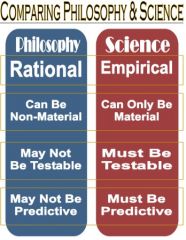
|
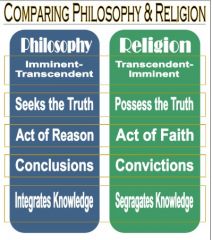
|
|
|
Theology |
the application of philosophical categories to better understand the spiritual |
|
|
Spirituality
|
refers to the pursuit of transcendent reality that at least in some respects are beyond the material. |
|
|
Myth |
refers to stories used to advance what a person or group holds to be true in order to invite people to embrace a cosmology |
|
|
Science |
refers to the rational investigation and explanation of repeatable material occurrences using categories |
|
|
Nature |
refers to the qualities shared by all members of a particular group that distinguish that group from all other groups. Nature is synonymous with essence.
|
|
|
Without God |
1. Existence is without purpose. 2. Meaning must be made and imposed. 3. Happiness can only be transient and incomplete |
|
|
With God |
1. Existence has a purpose 2. Meaning must be discovered and accepted. 3. Happiness can be lasting and complete |
|
|
Theist |
I do believe that God exists |
|
|
Atheist |
I dont believe God exists |
|
|
Agnostic |
I don’t know whether or not God exists |
|
|
Pascal |
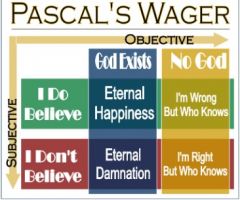
|
|
|
three kinds of arguments for the existence of God |
1. Ontological argument is based in reason. 2. Cosmological argument is based in experience. 3. Moral argument is based on the need for justice. |
|
|
Prime Mover |
that not everything moves or changes every other thing in a cause effect relationship. There needs to be a creator that sets the patterns for change and sets the process in motion. God fits into the big cosmic picture in the role of the big banger.We can trace the origin of the universe back to a point called the big bang |
|
|
First Cause |
nothing can cause itself, so in the beginning there has to be a first cause Who created the prime matter? God fits into the big cosmic picture in therole of the prime matter maker |
|
|
Necessary Being |
states that reality cannot consist of only contingent beings, there must be at least one being that had to exist If existence is based only on contingent beings, then the series of beings must regress endlessly.A beginning (big bang) requires a necessary being. God fits into the big picture in the role of the Had-To-Be Being. |
|
|
Perfect Being |
states that we can identify gradations in being from superior to inferior |
|
|
Grand Designer |
states that because creation works in concert with itself it must be the product of design. |
|
|
Knowledge |
refers to a collection of integrated concepts that are believed to be true. |
|
|
Demonstrative Knowledge |
an be demonstrated as true. Reasonable people cannot disagree |
|
|
Dialectic Knowledge |
is that which is believed to be true, but the truth cannot be demonstrated. Reasonable people can disagree. |
|
|
Practical knowledge |
refers to concepts that are anchored in reason, but exist primarily in the order of reality. This arises from experience. |
|
|
The Role of Faith |
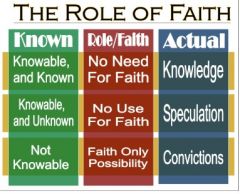
|
|
|
Monotheist |
believe in one God distinct from the creation (Dualism) |
|
|
Unitarian |
believes in one God in one person |
|
|
Trinitarian |
believes in one God in three persons. |
|
|
Polytarian |
believes that God and the creation are identical |
|
|
Panentheist |
believes that all creation is within God, but God is greater than the creation |
|
|
Polytheist |
believes in the independent existence of more than one god. |
|
|
Materialism
|
is the view that reality consists only of matter
|
|
|
Idealism |
the view that the basis of reality is idea, ideal, spirit, or form rather than things |
|
|
Dualism |
refers to the view that reality consists of both idea and matter Because mind and the body do not share the same characteristics, they cannot be the same thing—they must be two things |
|
|
Monism |
refers to any view that holds that reality is reducible to one and only one substance |
|
|
Four views of Reality |
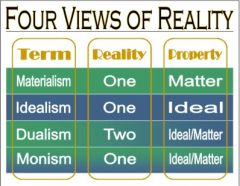
|
|
|
Essentialism
(Cosmology) |
Theist refers to the view that essence (what it is) precedes existence (that it is) which leads to belief in the existence of God |
|
|
Non-Essentialism (Cosmology) |
Agnostic
refers to the view that the question of essence and existence cannot be resolved. |
|
|
Existentialist (Cosmology) |
Atheist refers to the view that existence (that it is) precedes essence (what it is) so God is not needed |
|
|
Primary Cosmologies |
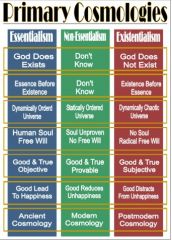
|
|
|
East Vs West Cosmologies |
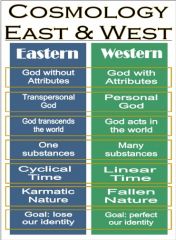
|
|
|
Cosmological beliefs and values
|
1. Time is cyclical; the universe has no real beginning or ending. 2. The future will not be different from the past in any important way. All change is superficial. 3. Truth has been given and no investigation is needed. What we can find out on our own is insignificant. 4. Reality is not broken and people are getting exactly what they deserve. 5. Material reality is an illusion we must escape the samsara cycle to experience happiness. |
|
|
Humanity beliefs and values |
1. We are not distinct from each other, but manifestations on the one ultimate reality. 2. We’ll keep coming back until we can finally escape the samsara cycle. 3. We can find happiness only in escaping the here and now through spiritual means |
|
|
Fects |
refers to the Latin word facere which means to make or do When a form is thoroughly actualized, it is said to be perfect, which can only be finally and fully had in Eternity. |
|
|
Potency |
refers to what could be the reality, but at the moments isn’t reality. Something has potential when it has a capacity to hold an act. The potency limits the act. |
|
|
Act |
refers to what is reality An act realizes some potential when it causes a capacity to be realized. |
|
|
Potency vs Act |
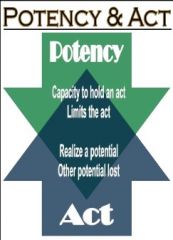
|
|
|
Essence |
refers to the identity of a thing or an act with all of its properties in a certain condition. |
|
|
Substance |
refers to the identity of a thing or an act with all of its properties. It’s is nessin a universal sense. |
|
|
Accidents |
traits that cannot exist apart from a substance and are not properties of a substance, but reveal the substance. Accidents actualize substance leading to essence. |
|
|
Change |
refers to the process of becoming. 1. Change that actualizes a potential is called generation. 2. Change that removes an actuality is called corruption. |
|
|
Principles of Changes |
1. Subject principle is the potential in which the change occurs and which survives the change. 2. Form principle refers to what is actualized at the end of the change. 3. Privation principle refers to what is lost because a form was actualized |
|
|
Degree of Change |
1. Accidental (incidental) change results in a change in condition while the substance is maintained. 2. Substantial change results in a change in identity. |
|
|
Transcendentals |
refer to the properties that go beyond the particulars of any one thing. They are possessed by all things that exist simply because they do exist. |
|
|
categories of essence and existence |
1.Essence refers to what it is. 2.Existence refers to that it is. |
|
|
Aseity
|
means that existence originates within itself and not from an outside source
|
|
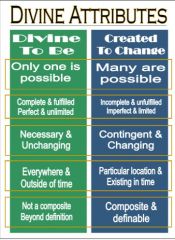
|
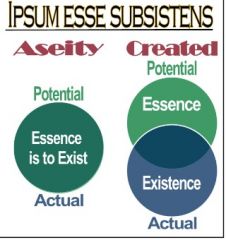
|
|
|
Static Ordered View |
Change occurs in the universe in constant predictable relationships because things and event are linked by absolute necessity. You drink, you drive, and you die! |
|
|
Dynamic Chaotic View |
Change occurs in the universe in unpredictable ways. Anything can happen because there are no necessary relationships linking things and events. Traffic accidents happen regardless of whether or not drivers drink. |
|
|
Dynamic Ordered View |
Change occurs in the universe in generally predictable relationships. Constrained randomness describes how change occurs when there are varying degrees of practical necessity. About 40% of traffic fatalities result from alcohol related accidents. |
|
|
Absolute Necessity |
refers to a relationship whereby it is impossible for one thing or event to occur unless or until another thing or event occurs first. Learning is an absolute necessity to being educated |
|
|
Practical Necessity |
refers to a relationship whereby it is possible but difficult for one thing or event to occur unless or until another thing or event occurs first Schooling makes learning more attainable. |
|
|
Necessity Free |
refers to two things or events that have no necessary relationship with each other. It’s not necessary that a student has brown hair in order to be school |
|
|
Constrained Randomness |
refers to the relationship between chaos and order, change and constancy in a given thing or act due to the boundaries set by the nature of the thing or act in question. Chaos means unpredictable not uncaused Think that crazy triangle or butterfly |
|
|
Faculties
|
refer to abilities that occur in persons due to their nature. Humans, like many other animals, possess three key faculties of the soul. 1.Appetites 2.Intellect 3.Will |
|
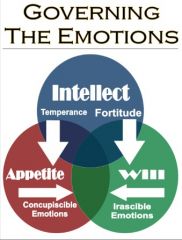
|

|
|
|
Appetites |
refers to the automatic and uncritical attraction to what appears good or the repulsion from what appears evil. 1. Appetites signal the need for a good. 2. External things activate appetites. 3. This is a two-step process. a.Sensations causing an involuntary tension that either attracts or repels. Lunch smells fabulous. b.This provokes an action to obtain or avoid. I’m hustling toward the lunch line. |
|
|
Intellect |
refers to our capacity to know and understand in general and specifically to the distinctively human ability to form concepts. 1. The Intellect gives us the power to create intentions. 2. The Intellect gives us the power to give or withhold consent to the intentions we have made. |
|
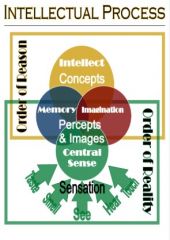
|
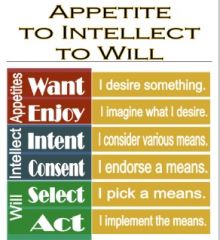
|
|
|
Will |
refers to the ability to act on our own initiative; the freedom to choose even in opposition to one’s own nature—we can override our natural human inclinations.
1. The capacity to select and act on intentions. 2. The will permits us to pursue what we value even if what we value is not good. 3. The will permits us to avoid what we disvalue even if what we disvalue is good. |
|
|
Characteristics of the faculties |
1.Intellect: Reason meaning sensible, balanced, fair, and logical. 2.Will: Assert meaning confident, decisive, and bold. 3.Appetite: Feel meaning the experience of the emotions |
|
|
Balance |
means a state of soul and mind experienced as harmony, stability, and completeness or simply happiness. 1.All of the great religious and philosophical traditions teach that happiness is most readily found in a balanced soul and life. 2.Virtues balance the soul. 3.Vices are attachments that unbalance the soul. |
|
|
Mind
|
refers to the processes and activities of the soul and its faculties, interacting with each other, other bodily systems, and external reality
|
|
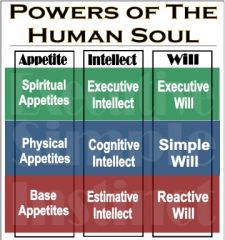
|
|
|
|
Instincts |
refer to those qualities that give us capacity to react to our surroundings quickly and without deliberation. Instincts unconsciously incline us towards behaviors
|
|
|
Spiritual Appetites |
refer to attractions to spiritual or formal goods. |
|
|
Executive Intellect |
produces panoramic reasoning meaning the ability to take the mental step back and see the bigger picture |
|
|
Executive Will |
permits individuals to make command decisions for which they are morally responsible. We can deliberate brakes that control our acts triggered by our instincts |
|
|
Physical Appetites |
refers to attractions to physical or material goods tempered by the Cognitive Intellect |
|
|
Cognitive Intellect |
refers to reasoning that demonstrates skills. 1. The Cognitive Intellect produces habitual practical reasoning—reasoning we use in routine tasks. Writing, driving 2. Practical reasoning that promotes excellence and is well engrained in the Intellect is called a moral virtue. Prudence, Temperance, Justice, and Fortitude |
|
|
Simple Will |
refers to routine activities which have been established by the Executive Faculties. 1. It allows us to perform complicated behaviors because we have habitualized some aspects of it. Driving 2. We are able to make decisions while in stressful situations because of habits. Marines in combat |
|
|
Conscience |
is a judgment of reason whereby people recognize the moral quality of an act that they are going to perform, are in the process of performing, or have already completed |
|
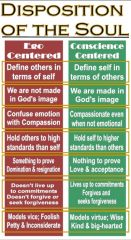
|
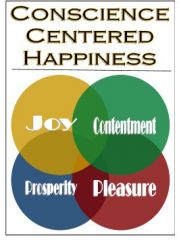
|
|
|
Conscience |
means together with knowledge referring to our knowledge of the cosmos and our place in it. Conscience is a disposition of the soul. |
|
|
Synderesis |
refer to the innate ability to distinguish good things from evil things, right from wrong. Synderesisis the knowledge of the universal practical principles of moral action. |
|
|
Acquired Conscience |
refers to the development or formation of conscience that gives us the ability to address more complex moral questions by way of fully employing our executive faculties. Acquired Conscience refers to what we come to value as the result of formation |
|
|
Circumstantial Conscience |
refers to ones last best ethical decision that we can make in a given instance It is the stage of moral maturity that we are in at the point at which a decision is made. |
|
|
Cohort |
refers to a friendship in which the parties recognize the good qualities of the other person leading to disinterested cooperation. |
|
|
Comrade |
refers to a friendship in which the parties recognize the goodness or good qualities of the other person leading to fondness |
|
|
Caregiver |
refers to a friendship in which the parties recognize the goodness or good qualities of the other person leading to fondness |
|
|
Consort |
refers to a friendship in which the parties recognize the goodness or good qualities of the other person causing desire. |
|
|
Covenantor |
refers to a friendship in which the parties recognize the goodness or good qualities of the other person that causing them to make and sustain a covenant. |
|
|
Covenant |
is a relationship in which the individuals belong with each other. It’s a relationship that creates identity. Marriage |
|
|
Modes of Reasoning |
refers to the two kinds of reasoning proper to human beings. Each kind of reasoning can be employed if the formation of conscience |
|
|
Rational Mode |
reasoning seeks to discover meaning in terms of the thing itself. 1. Left brain centered. 2. Reasoning is disinterested meaning that it requires no relationship or empathy to understand the meaning. 3. Reasoning is division—thinking in terms of the parts and dealing with how. 4. Rational mode can capture a categorical truth called a fact and with this are created reports. 5. The credibility of the report lies in its details. Philosophy and Science are examples |
|
|
Mystical Mode |
reasoning seeks to discover meaning in terms of something apart from the thing itself. 1. Right brain centered. 2. Reasoning is empathetic meaning that it requires a relationship or a similar experience to understand the meaning. 3. Reasoning is composition—thinking in terms of the big picture and dealing with why. 4. Mystical mode can point at a non-categorical or an ineffable truth using a metaphor and with this are created stories. 5. The credibility of the story lies in the whole. Religion and Literature are examples |
|
|
Agreement (Cause and Effect) |
Compare cases where the effect is present in search of a common causal element |
|
|
Difference (Cause and Effect) |
Compare cases where the effect is present to proximate cases where it is not present in search of a distinguishing element. |
|
|
Joint (Cause and Effect) |
Both agreement and difference. |
|
|
Variation (Cause and Effect) |
Look for parallel patterns of change |
|
|
Residue (Cause and Effect) |
What’s left when all else is counted. |
|
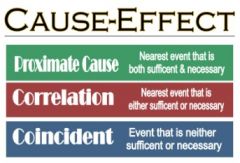
|
All reasoning no matter how simple or complex involves making comparisons leading to conclusions. 1. Virtues balance avoiding extremes. 2. In other words, virtues are reasonable. |
|
|
Theories of Truth |
Truth theories answer the question: How do we determine whether or not a statement is true? 1. Each theory has a different criterion for determining if the statement is true and reflects a different facet of the Epistemic Cycle. 2. Truth theories can function in both the rational and mystical modes. |
|
|
Correspondence |
theory states that a statement is true if it expresses what appears to be the case. 1. Based on observation 2. Employed in empirical settings 3. Strength: Closest to reality w/out involvement 4. Weakness: Observation error 5. Limit: Access to event 6. Watch the game Think Jane Goodall |
|
|
Coherence |
theory states that a statement is true if it expresses what a knowledgeable source holds to be the case. 1. Based on authority 2. Employed in a research setting 3. Strength: Easy access to knowledge 4. Weakness: Superficial 5. Limit: Problem of new knowledge 6. Read about the game reading about the news |
|
|
Pragmatic |
theory state that a statement is true if it expresses what experience says is the case. 1. Based on experience 2. Employed in anecdotal setting 3. Strength: Familiar/feels true 4. Weakness: Too subjective 5. Limit: lack of experience 6. Play in the game |

